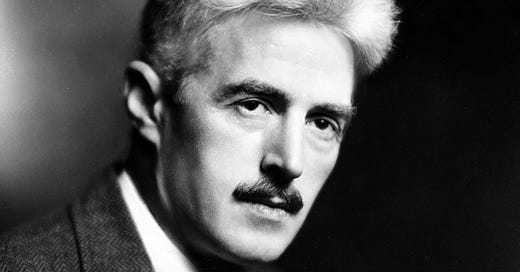In Dashiell Hammett's novel The Maltese Falcon, Sam Spade recalls a case from when he was a young private detective. A man disappeared between lunch and a scheduled 4 o’clock golf game. He wasn't seen for years. Finally a sighting occurred and Spade was dispatched to follow it up. The missing man explained that on the way to lunch that day, a falling beam from a construction site nearly killed him. Though the beam missed, he was struck by the capriciousness of life. He decided then and there to abandon his boring life and step out in a new direction. The curious thing was that the new life he created for himself turned out to be a close duplicate of the life he had abandoned. The older, world-weary Spade was not one to draw deep conclusions. He simply noted the irony and observed that each life has its patterns.
Conversion experiences — jolting moments that cause a reevaluation of beliefs or life course — are noteworthy in history. The Pharisee zealot Saul was approaching Damascus when a bolt from heaven knocked him off his horse and a voice from on high demanded to know why he was hunting down Christians. Saul was sufficiently flummoxed that he became Paul, and the bitterest enemy of Christianity became its most effective disseminator.
The Roman emperor Constantine saw a Christian symbol in the sky before a battle. He publicly embraced Christianity and ordered an end to the persecution of Christians, facilitating the spread of the religion throughout the western world.
Dramatic moments like these are memorable in part because they are rare. Sudden conversions happen, but they don't always stick. Beliefs and attitudes develop over lifetimes. They're unlikely to be flipped in an instant. Which is why historians have long suspected that the stories of Paul and Constantine were more complicated than the Christian faithful wanted to admit.
Close brushes with death do cause people to reevaluate their lives. But the reevaluation can produce a doubling down on existing agendas. John Hinckley attempted to assassinate Ronald Reagan in 1981. His aim was poor but one shot ricocheted and hit Reagan between the ribs. The slug, flattened into a sharp-edged disc, came to rest within millimeters of Reagan's heart. The president attributed his narrow escape to Providence. “Whatever happens now I owe my life to God and will try to serve him every way I can,” Reagan wrote in his diary.
Reagan believed God wanted him to rid the world of nuclear weapons. He worked toward that goal by a roundabout method. He directed a major buildup of American arms and launched an initiative to put weapons in space. His thinking was that the Soviets would be compelled to accept arms control. They were, and before he left office he and Mikhail Gorbachev had agreed upon the first important arms reductions of the Cold War.
The bullet of a would-be assassin hit Donald Trump in the ear in the summer of 2024. Trump's narrow escape made him feel he had been spared to complete the work he had started during his first term as president. “I was saved by God to make America great again," he told Congress and the American people.
Like Reagan, Trump took his glimpse of mortality not as cause for a change of course but as a divine signal to keep to the course already charted.
Sam Spade wouldn't have been surprised. A beam falling by accident or a bullet intended to kill can cause anyone to ponder the meaning of life. Actually changing a life requires something more. Paul and Constantine each experienced his own version of that something more. Most of us don't.




Always fun to read your musings professor.
Couple thoughts
Quote: The Roman emperor Constantine saw a Christian symbol in the sky before a battle. He publicly embraced Christianity and ordered an end to the persecution of Christians, facilitating the spread of the religion throughout the western world.
Thought: as a skeptic atheist, I don't buy the "saw it in the sky" element. I think Constantine was more calculating and pragmatic- Christianity was spreading anyway and the persecutions only made Christians believe more strongly they were right. His embrace of a spreading religion was a means to harness it while in power.
Quote: The bullet of a would-be assassin hit Donald Trump in the ear in the summer of 2024
Thought: hit in the ear? Again skeptical. 1. Trump never released his medical records. 2. Trump's pill peddling doctor Ronny Jackson said Trump had a 2 cm-wide gunshot wound in the right ear. Maybe he used metric to confuse most Americans who can't calculate metric to standard, but 2 centimeters is 20 millimeters ! Three-quarters of an inch! That portion of the ear is cartilage and does NOT grow back and his ear is in far too good of condition to have had plastic surgery that fast. My suspicion is that he cut his ear in a minor, but readily bleeding fashion, on a secret service plastic holster or gun as the pushed him to the ground.
No bullet hit his ear. Perhaps a chip off the teleprompter but definitely not a bullet from a rifle.